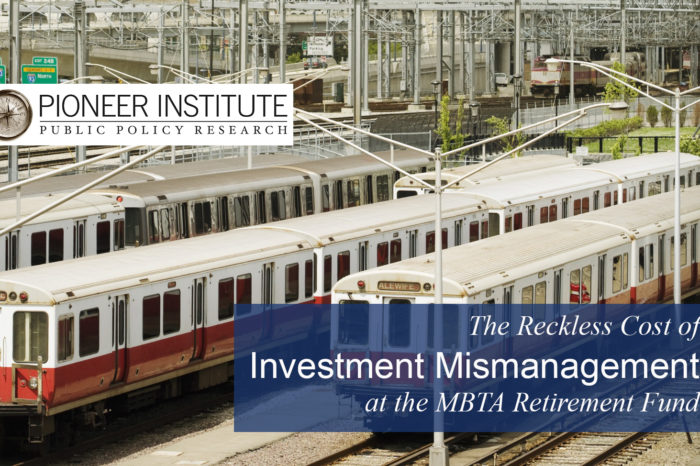Study: T Pensions Would Be Worth $902M More Had Assets Been Managed by State Pension Fund After 2000
MBTA would have saved $676 million, T pensions would have been fully funded
BOSTON – Had MBTA Retirement Fund (MBTARF) assets been placed in the state pension fund at the end of 2000, their value would have been an estimated $902 million greater by 2014 and T pensions would have been about fully funded, according to a new study published by Pioneer Institute.
The MBTARF’s net pension assets were about $1.6 billion at the end of 2014. If managed by the state pension fund, they would have been almost $2.5 billion.
The cash-strapped MBTA has to make up $676 million of the lost value under a pension agreement that holds it responsible for three quarters of the money needed to keep the fund afloat. T employees have to pitch in another $225 million.
“Broken governance invariably leads to poor results,” said Iliya Atanasov, author of “The Reckless Cost of Investment Mismanagement at the MBTA Retirement Fund.” “Resisting transparency and taking excessive risks are common precursors of massive losses.”
The deterioration of the MBTARF’s financial position comes despite the fact that T contributions to the fund have more than doubled from $35 million in fiscal 2009 to $78 million in fiscal 2016. Early projections show the MBTA contribution rising to $84 million in fiscal 2017.
Some $119 million in MBTA contributions for fiscal 2014-2016 would have been unnecessary had T pension money been invested with the state’s Pension Reserves Investment Management (PRIM) Board.
In recent years the MBTARF lost $25 million it invested in a hedge fund represented by the T pension fund’s former executive director, then hid the loss for at least a year. The MBTARF also attempted to make its financial condition look better by hiking its assumed rate of investment returns from 7.5 percent to 8 percent, even as pension funds across the country were lowering their targets.
“The MBTARF still went from being over 97 percent funded in 2005 to having less than 65 percent of the money it needed to pay out earned benefits in 2014,” added Atanasov. “In 2015, it likely hit the lowest funding level in at least 25 years.”
The MBTARF’s investment expenses are also much higher than PRIM’s. Between 2004 and 2014, the state fund trimmed investment fees substantially. In the five years ending in 2014, PRIM’s direct investment fees were about 15 basis points. The MBTARF’s were more than three times higher at 48 basis points.
The composition of the MBTARF’s portfolio is one critical reason for the high costs. In recent years, the fund has loaded up on high-risk, high-cost investment vehicles. Nearly three-quarters of the target portfolio is in equities and high-risk investments, including 30 percent in alternative investments, more than a third of which are hedge funds of funds – a market segment that has performed poorly and comes with high fees. Such an asset allocation invites disaster in the next market downturn.
Even MBTARF fixed income investments feature excessive risk. Junk bonds and unrated debt accounted for nearly 36 percent of the fund’s fixed income portfolio in 2014.
The MBTARF similarly loaded up on high-risk debt prior to the last financial crisis in 2007. The fixed-income portion of its portfolio shrank from $429 million in 2007 to $323 million two years later.
About the Author
Iliya Atanasov is Pioneer’s Senior Fellow on Finance, leading research on pension management, budget analysis, infrastructure and municipal performance. Iliya received his PhD in Political Science from Rice University, where he was a Presidential Fellow. He also holds BAs in Business Administration, Economics and Political Science/International Relations from the American University in Bulgaria.
About Pioneer
Pioneer Institute is an independent, non-partisan, privately funded research organization that seeks to improve the quality of life in Massachusetts through civic discourse and intellectually rigorous, data-driven public policy solutions based on free market principles, individual liberty and responsibility, and the ideal of effective, limited and accountable government.
This report is the latest in a series published by Pioneer Institute over the past four years aiming to bring about greater transparency at the MBTA Retirement Fund and improve the transit system’s performance. Read our related publications below:
- Myths and Reality about MBTA Pensions
- A $49 Million Sweetheart Deal How MBTA Employee Unused Sick Time Perk Enhances Pensions
- Hard Lessons for Institutional Investors from the MBTA Retirement Fund
- Have the MBTA’s Retirement Plans Gone Off the Rails?
- The Reckless Cost of MBTA Financial Derivatives
- MBTA Reform – The Case of Full, Final and Binding Interest Arbitration
- How to Save the MBTA More Than $100 million a year
- Solvency and Insolvency of the MBTA Retirement Fund
- The Pacheco Law has cost the MBTA more than $450 million – here’s the evidence.
- Testimony Before the Joint Committee on Transportation in Support of House 3347
- Testimony in Support of House 3347 Transportation Reform
- MBTA’s Problem Is Not Lack of Funding
- The MBTA Commuter Rail’s Cost Structure is Off the Rails
- Massachusetts Experience with Hard and Soft Receiverships



